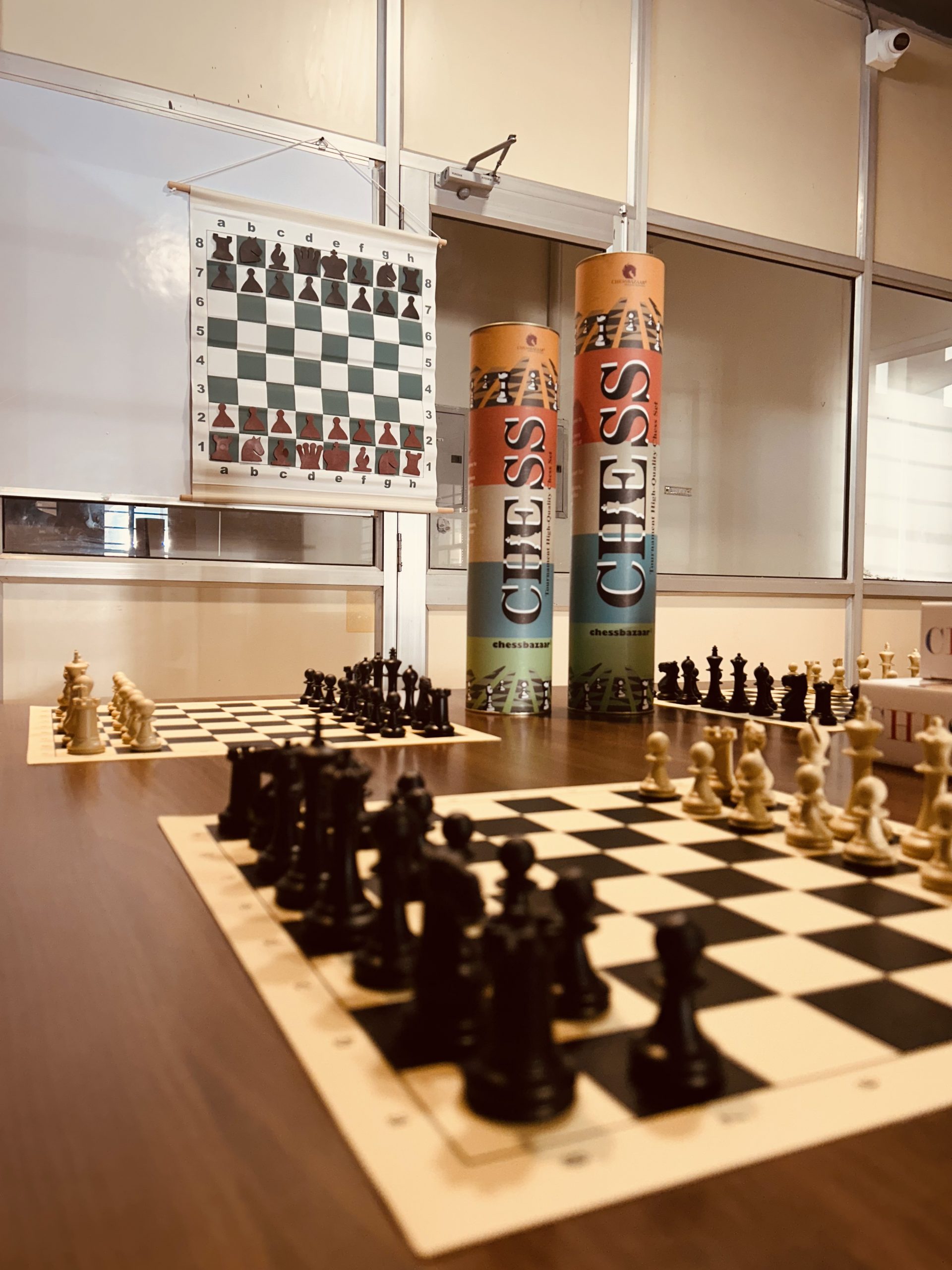The need of incorporating chess into the education curriculum for students
 Whether you have played Chess or not, you might be aware that playing Chess sharpens the mind of the players. And these positive outcomes are not restricted to a certain age group. In fact, for kids, a chess set can work well in strengthening their minds.
Whether you have played Chess or not, you might be aware that playing Chess sharpens the mind of the players. And these positive outcomes are not restricted to a certain age group. In fact, for kids, a chess set can work well in strengthening their minds.
Don’t tell us you didn’t know it. Oh, you didn’t?
Fortunately, you’re at the right place today to find out how Chess can work wonders for kids, how playing the game of kings benefits young brains, and how Chess induces sharp cognitive skills in kids. And a lot more about the sport and its relation with the young minds.
Let’s start with addressing how Chess counts as the best mind sport for kids.
Promoting Kids to Play Chess – The Choice Every Parent Should Make
Every parent is on the lookout to find products that can help their kids learn new skills and offer a holistic development of mind. Here it is – a Chess set. It is one of the best sports for kids that sharpens their minds.
How?
Chess is an ancient game that holds a rich presence across the globe and the badge of being a prestigious sport for the intellects. Since its origin in India over 1500 years ago, the game has traveled across international borders and transformed from Chaturanga to Chess. But it is not why your kids should play the game.
The game of Chess is a proven tool for improving the intelligence level in kids. It offers enough space for kids to learn how to strategize, improves their concentration, enhances their cognitive abilities, and much more. You can find more details about the benefits of playing Chess for kids in the latter part of this blog.
Chess – The best sport for the minds of kids
Chess, often regarded as a game of intellect and strategy, stands out among educational tools for its ability to engage and challenge the minds of children. This ancient game, with its simple rules yet infinite complexities, offers a unique blend of entertainment and learning, making it an ideal sport for the developing minds of young players.
Unlike physical sports, which primarily enhance bodily strength and coordination, Chess targets the mind, offering a great exercise for the brain stimulating cognitive growth and development.
It is a sport that can be tailored to the individual’s pace of learning. For kids or beginners, the game is about understanding the movement of pieces and the basic rules. As players advance, they delve into deeper strategic elements, opening theories, endgame techniques, and tactical puzzles. This gradual increase in complexity helps maintain interest and provides a clear path for progression, which is vital for keeping children engaged and motivated.
Each move on the chessboard comes with its set of potential risks and rewards, teaching young players to weigh their options carefully, plan, and adapt to changing situations. These are invaluable life skills that extend well beyond the game, preparing children for academic pursuits, personal relationships, and professional challenges.
Benefits of Playing Chess for Kids
Chess offers numerous benefits for children’s cognitive development and overall well-being.
- Enhances Critical Thinking: Chess requires players to think ahead, consider various possibilities, and anticipate their opponent’s moves. It enhances critical thinking skills and teaches children to make strategic decisions.
- Improves Concentration: In a world full of distractions, Chess demands undivided attention. By focusing on the game for extended periods, children can improve their concentration and attention span, which can translate into better academic performance.
- Boosts Memory: Remembering past moves, strategies, and patterns is essential in Chess. Regular practice can enhance a child’s memory skills, which can be beneficial in academic studies and daily life tasks.
- Promotes Problem-Solving: Every chess game presents a unique problem to solve. Children learn to analyze situations, identify obstacles, and devise solutions, fostering their problem-solving abilities.
- Teaches Patience and Persistence: Chess teaches children that success often requires patience and persistence. They learn to overcome setbacks, adapt strategies, and keep striving towards their goals, valuable lessons that extend beyond the chessboard.
- Fosters Creativity: While Chess has defined rules and strategies, there’s ample room for creativity within the game. Children learn to think outside the box, explore unconventional moves, and develop their unique playing style.
- Encourages Sportsmanship and Respect: Chess teaches children to respect their opponents, follow the rules, and accept both victories and defeats gracefully. It instills values of sportsmanship, fair play, and respect for others, essential qualities in any competitive endeavor.
- Enhances Emotional Intelligence: Managing emotions is crucial in Chess, where frustration, excitement, and disappointment are common. Children learn to regulate their emotions, stay composed under pressure, and maintain a positive attitude throughout the game.
- Promotes Long-Term Brain Health: Research suggests that engaging in mentally stimulating activities like Chess can help maintain brain health and reduce the risk of cognitive decline later in life. By starting early, children can lay the foundation for lifelong cognitive fitness.
So what is stopping parents from introducing their kids to chess?
Addressing the Issue – Accessibility and Understanding of Chess
With an array of benefits of playing chess for children’s development, comes a significant hurdle that we need to confront: not every child has equal access to the resources and opportunities needed to learn and excel in Chess. This disparity can stem from various factors, including socioeconomic status, geographical location, and the availability of knowledgeable mentors. Addressing this issue is crucial to ensuring that the advantages of Chess are accessible to all children, irrespective of their background.
In the following sections, we’ll explore practical strategies to overcome these barriers, focusing on making Chess understandable, accessible, and an integral part of educational curricula.
Ensuring Chess is Understandable to All
Chess, with its rich history and complex strategy, can seem daunting to newcomers, particularly young children or those without access to learning resources. To address this challenge, it’s crucial to simplify the game for beginners and make learning resources widely available. Initiatives like chess workshops in schools, community centers, and online platforms can play a pivotal role.
These workshops can be designed to cater to different age groups and skill levels, ensuring that the fundamental concepts of Chess are conveyed in an engaging and accessible manner.
Promoting the Accessibility of Chess to All
Accessibility is key to democratizing the game of Chess and ensuring that everyone, regardless of their socioeconomic background, has the opportunity to engage with it. It can be achieved by providing affordable chess sets, creating communities in schools for practice and competition, and organizing chess events or tournaments that are open to all.
Libraries, schools, and community centers can serve as accessible venues for chess clubs and tournaments, offering a space where children can learn and play regardless of their ability to purchase a chess set.
Integrating Chess into the School Curriculum – The Need of the Hour
One of the most effective solutions to address the issue of accessibility and understanding of Chess is to incorporate it into the school curriculum. Making Chess a part of the educational system not only ensures that every child gets exposed to the game but also legitimizes it as a tool for cognitive and social development. Schools can offer Chess as an elective sport or integrate it into existing curriculum, providing structured learning and regular practice opportunities.
This approach can also help in training teachers to become proficient chess instructors, further ensuring that the benefits of chess education are maximized. Embedding Chess into the curriculum can bridge the gap in access and understanding, making the game truly universal and benefiting children from all walks of life.
Integrating Chess into the school curriculum can bring about a transformative change in the educational landscape, offering multifaceted benefits to students’ intellectual, social, and emotional development. This strategic game, when incorporated into academic settings, can significantly enhance the learning experience, providing students with skills that are beneficial both inside and outside the classroom.
Below are detailed insights into the benefits of adding Chess to the school curriculum:
Enhances Cognitive Skills
Chess is a powerful tool for developing higher-order thinking skills, including problem-solving, critical thinking, and spatial reasoning. It requires players to anticipate and evaluate the consequences of their actions, encouraging strategic planning and foresight. These cognitive processes are directly applicable to academic subjects, particularly in mathematics, science, and technology, where analytical skills are paramount.
Improves Academic Performance
Research has shown a positive correlation between Chess and academic performance. The skills acquired through Chess, such as concentration, memory, and logical reasoning, can enhance students’ abilities in subjects like math, reasoning, and science. Chess teaches students to recognize patterns, a skill that can improve their comprehension and analytical abilities in subjects like mathematics and physics.
Promotes Emotional Intelligence
Playing Chess involves managing both success and failure, which teaches students to handle their emotions effectively. It encourages resilience, helping students to bounce back from setbacks and persistence, instilling the value of hard work and dedication. These aspects of emotional intelligence are crucial for personal development and success in all areas of life.
Fosters Independence and Self-Improvement
Chess is a self-driven activity where improvement is directly linked to personal effort. Students learn to take responsibility for their decisions, analyze their mistakes, and strive for self-improvement. This autonomy and desire for self-betterment are invaluable traits that empower students to become lifelong learners.
Encourages Inclusivity and Equality
Chess transcends social, cultural, and economic barriers, offering an equitable platform for all students to compete intellectually. It can be particularly empowering for students who might not excel in physical sports or traditional academic subjects, providing an alternative arena for achievement and recognition.
Supports Diverse Learning Needs
Chess is adaptable to various teaching methods and learning styles, making it an excellent tool for inclusive education. It can be particularly beneficial for students with special educational needs, such as ADHD or autism, by providing a structured yet flexible framework for engagement and learning.
Prepares Students for the Future
The skills developed through Chess, such as strategic planning, risk assessment, and decision-making, are directly applicable to the challenges of the 21st century. By fostering these abilities, Chess can prepare students for future careers in fields that require complex thought processes and creative problem-solving.
It is very obvious now that chess can enhance the development of kids if added to their school curriculum. But without government interference, this goal may seem far from achieving.
Let’s talk more about it.
The Role of Government in Ensuring Benefits of Chess are Accessible to All
To translate the potential benefits of Chess into widespread educational gains, government intervention plays a crucial role. By supporting the integration of Chess into school curricula, governments can help cultivate a generation of strategic thinkers and problem solvers. Below are humble suggestions and rationale for government action in making Chess an integral part of educational systems worldwide.
Why Government Support is Crucial
- Standardization and Equity: Government endorsement can ensure that chess education is standardized across schools, providing an equitable learning opportunity for all students, regardless of their socioeconomic background. By integrating Chess into the national curriculum, the government can democratize access to this powerful educational tool, ensuring every child has the opportunity to benefit from the skills it offers.
- Funding and Resources: The successful implementation of chess programs requires adequate funding and resources, including chess sets, instructional materials, and trained educators. Government funding can alleviate these logistical challenges, ensuring schools have the necessary tools to offer chess education effectively.
- Teacher Training and Support: Implementing Chess in schools requires teachers to be familiar with the game and its educational benefits. The government can facilitate professional development programs and workshops for teachers, equipping them with the knowledge and skills to integrate Chess into their teaching practices effectively.
- Research and Development: Government-backed research can explore the long-term benefits of chess education, providing empirical evidence to support its continued inclusion in the curriculum. This research can also guide the development of best practices for teaching Chess in educational settings.
How the Government Can Help
- Policy Implementation: The government can enact policies that mandate or encourage the inclusion of Chess in the school curriculum. It can be part of a broader initiative to promote critical thinking and problem-solving skills among students.
- Grants and Financial Support: Offering grants and financial incentives to schools that incorporate chess programs can motivate educational institutions to adopt this initiative. Such support can help cover the costs of materials, teacher training, and tournament organization.
- Public Awareness Campaigns: The government can launch public awareness campaigns highlighting the benefits of chess education. By raising awareness, the government can garner public and private support for chess programs in schools.
- Partnerships with Chess Organizations: Collaborating with national and international chess organizations can provide schools with access to a wealth of expertise and resources. These partnerships can facilitate the development of curriculum materials, the training of teachers, and the organization of school chess clubs and tournaments.
- Inclusion in After-School Programs: Beyond the formal curriculum, the government can promote Chess as an after-school activity, providing students with additional opportunities to engage with the game and develop their skills in a less formal setting.
The government can draft such schemes that fulfill the agenda of incorporating Chess in the school curriculum. But before it happens, there are Chess stores that are playing their part responsibly by making quality chess sets accessible to all.
Let’s find out!
Delivering Affordable Chess Sets for Better Accessibility
In the present world where accessibility and affordability determine the reach and impact of educational tools, Chessbazaar, a leading India-based online chess store, has emerged as a key player in making Chess accessible to children across the globe. Embracing the motto’ Chess for Everyone,’ Chessbazaar has taken significant strides towards democratizing the game of Chess, particularly for young learners and enthusiasts. This initiative aligns perfectly with the growing recognition of Chess as an invaluable tool for cognitive and educational development.
Chessbazaar knows the importance of making Chess accessible to all, irrespective of economic background. Recognizing that the cost of chess sets can be a barrier for many families and educational institutions, the store offers a range of affordable chess items, specifically focusing on Tournament Chess Sets and Plastic Chess Sets. These products are designed to meet the needs of both budding enthusiasts and seasoned players, ensuring that everyone has the opportunity to learn, play, and enjoy Chess.
Adding Chess to the Curriculum: A Step Towards Brighter Future for Kids
In conclusion, the journey through the world of Chess and its integration into the lives and education of children presents a compelling narrative of growth, learning, and accessibility. From understanding the myriad benefits that Chess offers to young minds and addressing the barriers to access to highlighting the commendable efforts of organizations like Chessbazaar in making Chess accessible and affordable, this blog underscores the importance of Chess as more than just a game. It is a tool for educational enhancement, cognitive development, and social inclusion.
As we advocate for Chess to be integrated into the school curriculum and strive to make it accessible to all, we are not just teaching a game but nurturing a generation of thinkers, leaders, and innovators.
And yes, don’t forget to check out Chessbazaar‘s official website to buy chess sets from their vast collection, including plastic chess sets, tournament chess sets, and other chess accessories.

















Add comment